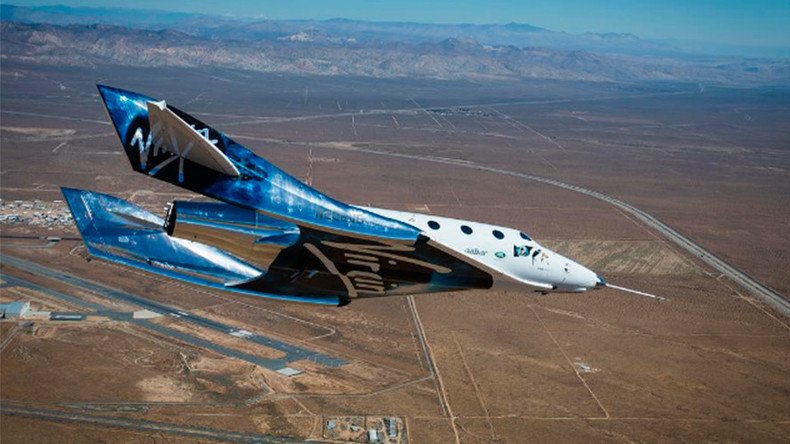Virgin Galactic conducts 1st test of new reentry system (VIDEO)

The world's first commercial spaceline, Virgin Galactic, has successfully conducted the inaugural flight test of its “feather” reentry system on its VSS Unity spacecraft at the Mojave Air and Space Port.
Monday’s test was the fourth glide flight of the company’s VSS Unity suborbital rocket-powered spaceplane, but the first to test out the unique “feather” reentry system. This essentially allows the craft’s twin tails to fold up, providing aerodynamic braking on its return from the lower atmosphere, ensuring those on board return to Earth safely.
“It’s kind of like a badminton birdie (shuttlecock) you throw that straight up and it’s always going to come down with the nose first and the part that spreads is the feather and it always comes afterward and that’s because the aeroforces always force it to come back in that orientation,” said project engineer Gabe Williams.
Image from today VSS Unity flies in the feather configuration, testing out the vehicle’s re-entry system. Read More: https://t.co/aUJrIFPXQPpic.twitter.com/ojgAT7XWKm
— Virgin Galactic (@virgingalactic) May 1, 2017
The VSS Unity was piloted on the day by Mark Stucky and Mike Masucci, with pilots Nicola Pecile and CJ Sturckow, as well as flight test engineer Dustin Mosher, in WhiteKnightTwo – the mothership which carried Unity into sub-orbit.
To Space! Stephen Hawking accepts Richard Branson’s offer to travel on Virgin Galactic (once ready) https://t.co/GAnjeHdP3Ppic.twitter.com/7kBP97AyI6
— RT (@RT_com) March 20, 2017
Though there is still plenty of data for the Virgin scientists to pore over, and undoubtedly more glide tests to come, it seems now to be only a matter of time before VSS Unity takes to the skies under the power of its own rocket engine, which may be by the end of next year, if Virgin Galactic boss Sir Richard Branson has his way.
READ MORE: Stephen Hawking plans space voyage on Richard Branson’s Virgin Galactic












